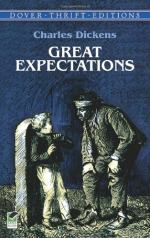On a moderate computation, it was many months, that Sunday, since I had left Joe and Biddy. The space interposed between myself and them, partook of that expansion, and our marshes were any distance off. That I could have been at our old church in my old church-going clothes, on the very last Sunday that ever was, seemed a combination of impossibilities, geographical and social, solar and lunar. Yet in the London streets, so crowded with people and so brilliantly lighted in the dusk of evening, there were depressing hints of reproaches for that I had put the poor old kitchen at home so far away; and in the dead of night, the footsteps of some incapable impostor of a porter mooning about Barnard’s Inn, under pretence of watching it, fell hollow on my heart.
On the Monday morning at a quarter before nine, Herbert went to the counting-house to report himself — to look about him, too, I suppose — and I bore him company. He was to come away in an hour or two to attend me to Hammersmith, and I was to wait about for him. It appeared to me that the eggs from which young Insurers were hatched, were incubated in dust and heat, like the eggs of ostriches, judging from the places to which those incipient giants repaired on a Monday morning. Nor did the counting-house where Herbert assisted, show in my eyes as at all a good Observatory; being a back second floor up a yard, of a grimy presence in all particulars, and with a look into another back second floor, rather than a look out.
I waited about until it was noon, and I went upon ’Change, and I saw fluey men sitting there under the bills about shipping, whom I took to be great merchants, though I couldn’t understand why they should all be out of spirits. When Herbert came, we went and had lunch at a celebrated house which I then quite venerated, but now believe to have been the most abject superstition in Europe, and where I could not help noticing, even then, that there was much more gravy on the tablecloths and knives and waiters’ clothes, than in the steaks. This collation disposed of at a moderate price (considering the grease: which was not charged for), we went back to Barnard’s Inn and got my little portmanteau, and then took coach for Hammersmith. We arrived there at two or three o’clock in the afternoon, and had very little way to walk to Mr. Pocket’s house. Lifting the latch of a gate, we passed direct into a little garden overlooking the river, where Mr. Pocket’s children were playing about. And unless I deceive myself on a point where my interests or prepossessions are certainly not concerned, I saw that Mr. and Mrs. Pocket’s children were not growing up or being brought up, but were tumbling up.
Mrs. Pocket was sitting on a garden chair under a tree, reading, with her legs upon another garden chair; and Mrs. Pocket’s two nursemaids were looking about them while the children played. “Mamma,” said Herbert, “this is young Mr. Pip.” Upon which Mrs. Pocket received me with an appearance of amiable dignity.




